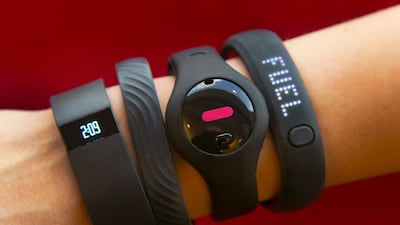The consumer electronics company Jawbone had more than enough money to take on Fitbit and other health-tracking devices in the wearables market.
That may have ended up being its biggest problem.
The top-tier venture capital firms Sequoia, Andreessen Horowitz, Khosla Ventures and Kleiner Perkins Caufield & Byers, and then a sovereign wealth fund, invested hundreds of millions of dollars in Jawbone, lifting its valuation to US$3.2 billion in 2014.
Ultimately, all that money could not save San Francisco-based Jawbone, which began liquidating proceedings last month after its fitness-tracker product failed to take off. It now ranks as the second-largest failure among venture-backed companies, based on total funding raised, according to the research firm CB Insights.
Jawbone's fall after raising more than $900 million provides a stark example of how the flood of cash pouring into Silicon Valley can have the perverse effect of sustaining companies that have no future, technology executives and financiers say.
The irony is Jawbone could have been a suitable acquisition target some years ago, these people say, had it just kept its valuation lower by raising less money from venture capital and sovereign wealth funds.
"They are basically force-feeding capital into these companies," said Sramana Mitra, a tech entrepreneur and consultant, and the founder and chief executive of the start-up accelerator One Million by One Million. "I expect there will be a lot more deaths by overfunding."
Jawbone launched in 1999 under the name AliphCom. It cycled through several products, including Bluetooth headsets and speakers, and in 2011 landed on stylish wearable devices to track exercise, sleep and other health data.
Along the way, Jawbone burned through more than $500m in equity and raised more than $400m in debt, the lion's share from BlackRock, according to the data provider PitchBook. But the company barely made a dent in the wearables market, with well below 5 per cent market share, and was vastly outperformed by Fitbit, Samsung and others, according to the analyst Jitesh Ubrani of International Data Corporation.
Still, Jawbone raised $147m in September 2014, bumping its valuation $3.2bn, according to Pitchbook. In November of the following year, Jawbone laid off 15 per cent of its staff amid financial troubles. By December 2015, BlackRock had marked down the company's shares by 69 per cent, according to Pitchbook.
Then, in 2016, the Kuwait Investment Authority (KIA) invested in Jawbone for the first time, leading a $165m round that halved Jawbone's valuation to $1.5bn. The KIA did not respond to requests for comment.
Start-up failures are not uncommon, but a billion-dollar company that has raised huge pools of money going belly up remains a rarity. Jawbone ranks behind the solar technology company Solyndra, which became the largest failure among venture-backed companies when it filed for bankruptcy in 2011.
Jawbone tried to sell itself in 2016, but was unable to find a buyer, according to investors with knowledge of the matter. It has been sued by vendors who allege the company owes them hundreds of thousands of dollars.
Some investors say failures like Jawbone will not seriously dent start-up funding in the near term. Venture capitalists last year raised $41bn, a record.
"Everyone is trying to find a way to play in the tech economy," said Rich Wong, a partner with Accel venture firm. "It's inevitable" that there will be big-ticket failures.
But the Jawbone situation could give pause to investors considering nine-figure investments in unproven firms, say venture capitalists.
A spokesman for Jawbone declined to comment. The co-founder and chief executive Hosain Rahman did not respond to requests for comment, and its VC investors declined to comment.
Alex Asseily, Jawbone's co-founder who resigned as board chairman and director in January 2015, said "it's saddening to see Jawbone end this way".
Wearables wear thin, along with chatbots.
p23

